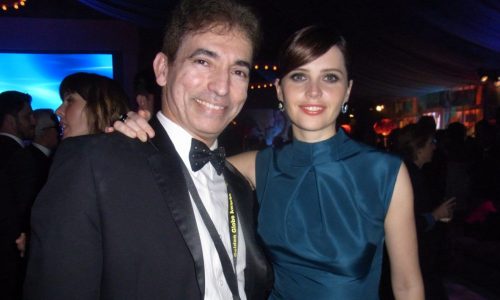The organisation behind the Golden Globes, the Hollywood Foreign Press Association, has sanctioned one of its members, for exposing corruption within the ranks of the group.

In August 2015, Sam Asi had been accused of revealing to What’s Worth Seeing that a Russian HFPA member, Nellee Holmes, had been suspended from the organisation for bullying Lena Basse, a Ukrainian journalist trying to become a member.
Ms Holmes had threatened to block Ms Basse’s membership unless she agreed not to write for any Russian outlets and handed over her tickets to the prestigious Golden Globes ceremony, which members are able to sell for hundreds of dollars, although some have been known to exchange hands for five-figure sums.
The secretive HFPA considered Ms Holmes’ actions and its sanctions against her to be confidential information which, under its own rules, should not be disclosed by members.
But a whistleblower told this website, to make it clear that an organisation which has long been dogged by allegations of corruption and wrong-doing, did indeed take action against members who threatened its reputation.
In 2014, a recent HFPA president Philip Berk struck a deal to take a voluntary leave of absence from the organisation – rather than be suspended – because of comments he made in a book. And in 2005, in one of the more high profile cases, a Northern Irish photographer Nick Douglas killed himself after being suspended over a controversy stemming from the sale of a photograph.
Membership of the HFPA is highly sought after by foreign journalists based in Los Angeles, because in addition to the kudos of voting on the Golden Globes, members are flown around the world to film festivals and press junkets and invited to all the hottest premieres and parties in Hollywood and beyond. And a membership in the region of 90, compared with more than 6000 for the Academy that hands out the Oscars, gives individuals an uncharacteristic level of influence in the industry. For this reason, membership is as closely guarded as it is highly sought after.
It is largely these privileges that are being removed from Mr Asi, so during the suspension, he will not be entitled to travel to events outside Los Angeles and will be barred from HFPA-organised events; he recently hosted such an event, being the moderator of a symposium of the directors of the Golden Globes Foreign Language nominees. But his sanctions are expected to be lifted in time for him to be able to attend the Cannes Film Festival in May.
News of the suspension of Ms Holmes also appeared in another publication, but the HFPA have not sanctioned anyone involved in revealing any information to them.
Few would argue that as a private organisation, the HFPA has a right to seek to keep the management of its membership behind closed doors and it is perfectly entitled to set its own rules, but a group that wields such influence in Hollywood and is taken so seriously by the industry and the public should not be surprised if fans and film-makers alike express an interest in who is handing out the awards and how the decisions are made. And when the organisation has, in the past, been tainted by controversy, the Hollywood Foreign Press Association could be accused of using the threat of sanctions to silence members – journalists – who would prefer to reveal that scandals are dealt with, rather than covered up.
After considering Mr Asi’s case for about 18 months, the HFPA concluded that he disclosed confidential information to this website and imposed the sanctions after a vote of its membership.
Its decision to suspend a whistleblower has come a month after this year’s Golden Globes ceremony, at a time when the HFPA is furthest from the headlines, thereby avoiding any embarrassment that might have arisen had this emerged beforehand.
Under the terms of his sanctions, Mr Asi is unable to comment. We are awaiting a response from the HFPA.
